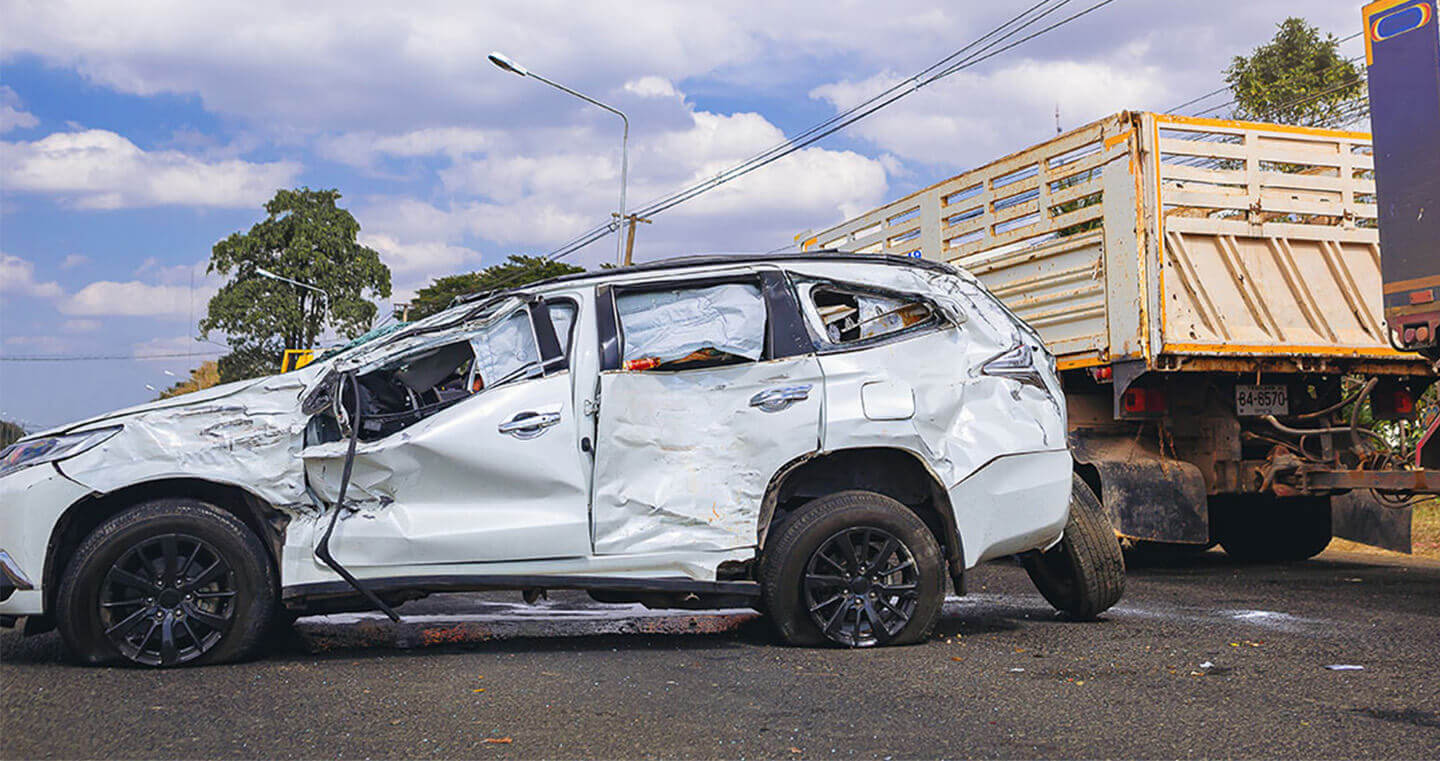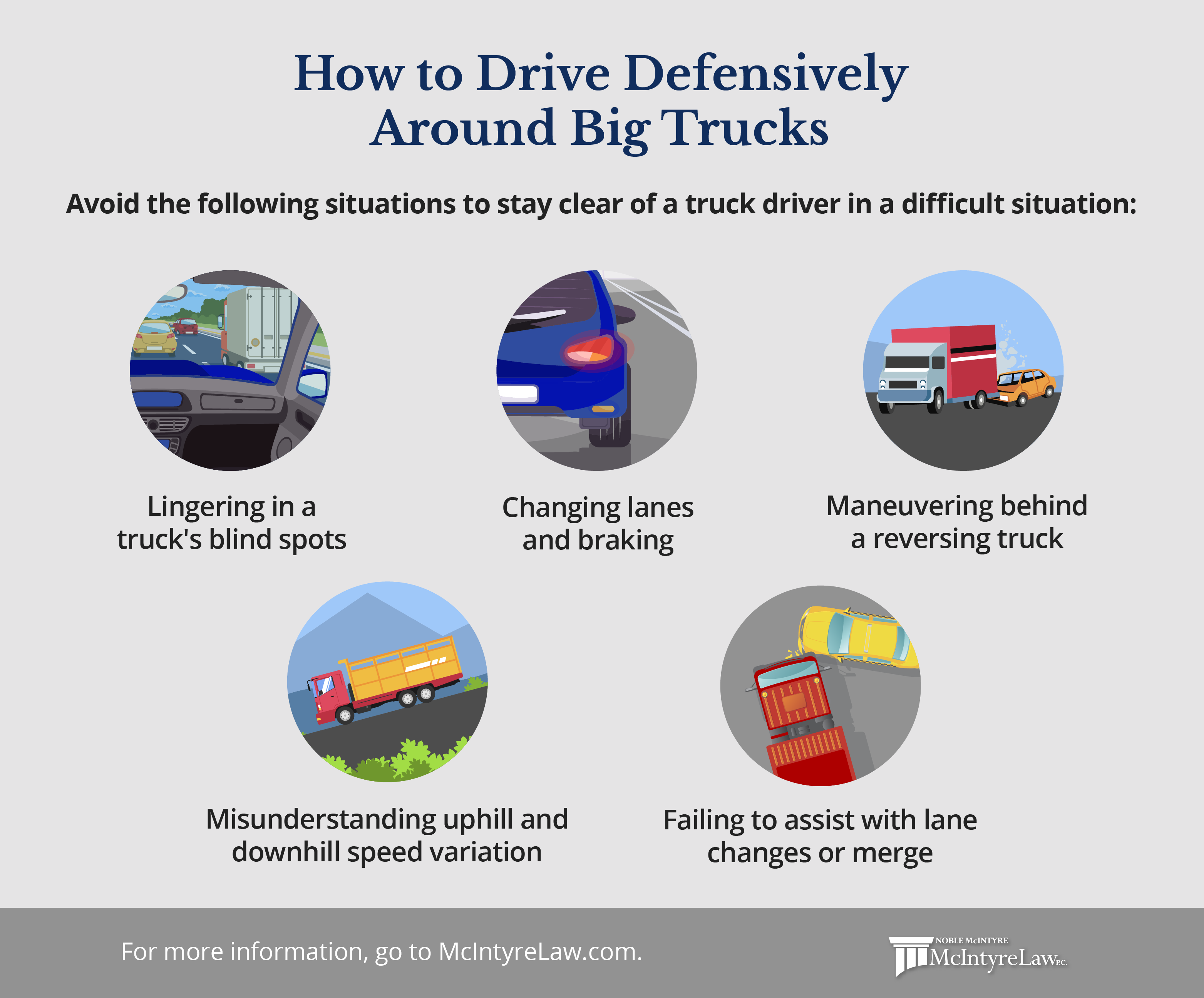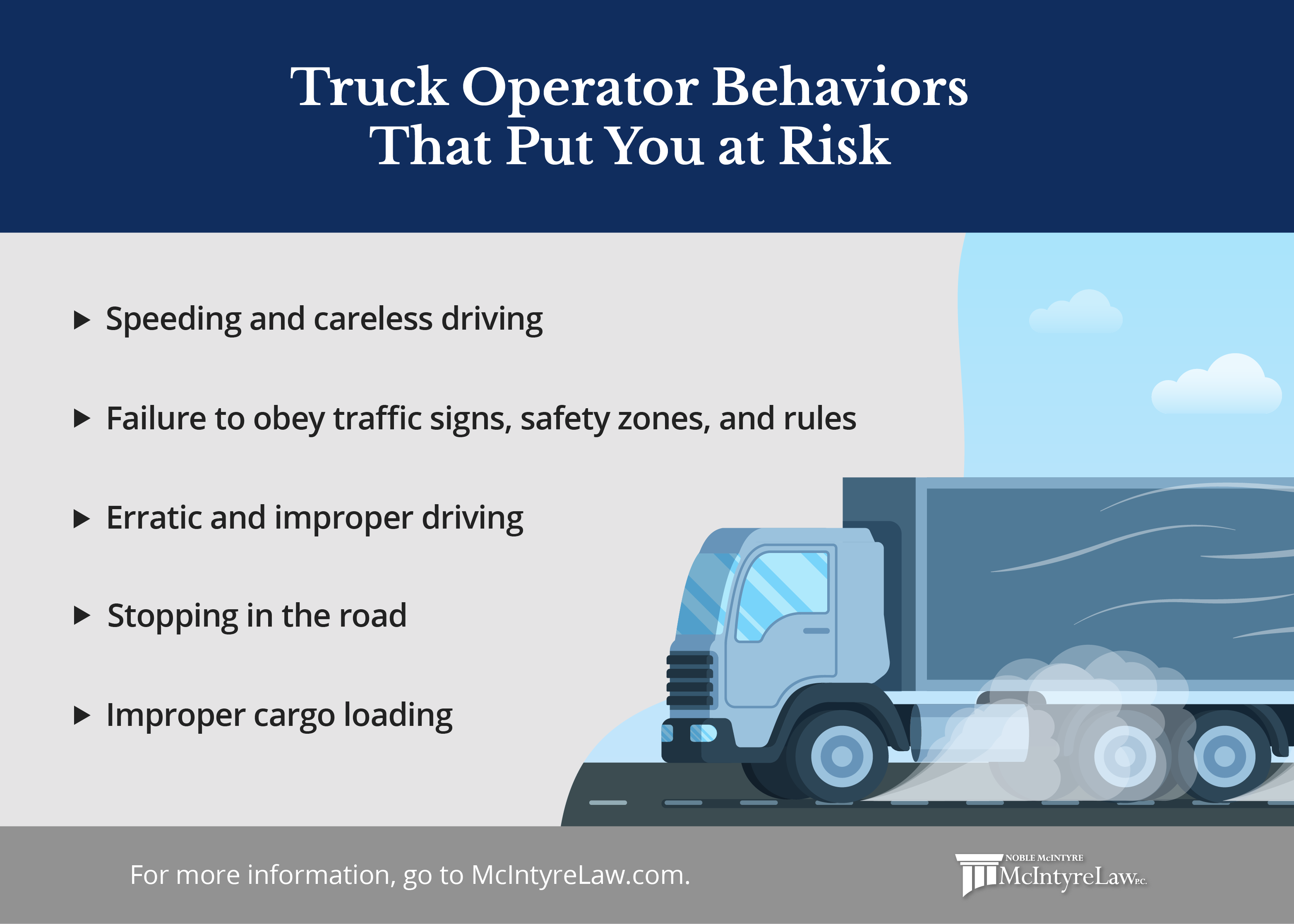
Guide to Avoiding Trucking Accidents
Published on October 12, 2023At McIntyre Law, we’ve helped a lot of people who were injured in truck accidents. It’s part of our purpose and life’s work, but when it comes down to it, we would prefer that those clients were never in an accident in the first place. Even when we prevail in a case against a negligent trucking company, it’s hard to see it as anything other than making the best of a bad situation.
In this guide, we’ll present information about sharing the road with big trucks that will help keep you safe and lower the chances that you’ll ever need a personal injury attorney.
How to safely share the road with semi-trucks and tractor-trailers
Any licensed driver has encountered commercial carriers, also called tractor-trailers, 18-wheelers, semi-trucks or big-rigs. Many of these vehicles can weigh up to 80,000 lbs, which is equivalent to 40 tons. They can be almost 80 feet long when towing a single trailer, and even longer with a double trailer in tow. Given their size and destructive potential, these large trucks pose the greatest risk of serious injury on the roadways.
Unfortunately, too many accidents involving passenger cars and semi trucks occur each year, resulting in tens of thousands of injuries and death. In many of these cases, the driver of the truck is at fault. Understanding the dangers of flatbed trucks and the limitations their drivers face can allow you to drive defensively and avoid a serious accident.
Improve your driving by understanding how commercial truck drivers navigate traffic

Tractor trailers are large and heavy, which is what makes them so dangerous. Their size and weight also makes them difficult to drive, requiring training and a specialized license. By avoiding the following situations, you can stay clear of a truck driver in a difficult situation, and more importantly, avoid being the cause of the situation.
- Lingering in a truck’s blind spots. Trucks have large blind spots to the right and rear of the vehicle. Smaller blind spots exist on the right front corner and mid-left side of the truck. The worst thing a driver can do is remain in a truck’s blind spot where their vehicle cannot be seen. When passing a truck, commit and complete the pass quickly.
- Changing lanes and braking. Never pull into a small gap in traffic ahead of a truck, especially if you’re about to slow down to make a turn. Trucks take as much as three times the distance to stop as the average passenger car, so if you pull in and brake quickly, the truck may not be able to slow quickly enough to avoid hitting you.
- Maneuvering behind a reversing truck. It takes time and concentration to back a 48-foot trailer up without hitting anything. Sometimes a truck driver needs to make several attempts to reverse into tight quarters. It’s important to be patient and let the driver do their job in these situations, as trying to squeeze behind them can make the entire process more dangerous.
- Misunderstanding uphill and downhill speed variation. A fully loaded truck slows considerably when going uphill and gathers speed quickly when coming down the other side.. Truck drivers then use that speed to help the truck climb the next hill. To make hill driving safer for you and the truck driver, never guard the passing lane going your preferred speed. Let the truck driver pass or distance yourself from the truck.
- Failing to assist with lane changes or merges. It’s not easy to get a 22-foot tractor and 48-foot trailer into traffic. If a truck has a turn signal on, leave room for the truck to merge or change lanes. Indicate your willingness to allow the truck in by flashing your lights.
On average, more than 4,200 people are killed each year in commercial vehicle accidents across the United States, while over 70,000 are seriously injured. Driving with an awareness of why trucks do what they do will allow you to avoid becoming an accident statistic.
Common Causes Of Truck Accidents
Defensive driving will provide you with some protection against the dangers of 18-wheelers, but not in cases where the truck operator is negligent and 100% at fault. Driver error and irresponsible actions behind the wheel can be the initial or sole cause of serious incidents. Although there are many reasons a truck accident can occur, here are some of the most common causes of truck accidents.
How truck driver behavior can cause commercial trucking accidents

Truck drivers fill a very important role. Delivering products and materials in a timely and efficient manner helps keep our economy up to speed and growing. However, it’s also a truck operator’s responsibility to perform this job without putting other motorists at risk unnecessarily. When they fail to adequately consider the safety of others, they may engage in risky behaviors that cause harm to others.
- Speeding and careless driving. The weight and size of semi-trucks make these vehicles much harder to control, especially with short notice. When commercial truck drivers are traveling above the posted speed limit, they’re unable to stop quickly when needed. They’re also more likely to lose control of their vehicles, skid or hydroplane across the roadway. Additionally, the increase in speed impairs their visibility, ability to react to sudden changes, and ability to stop at red lights or stop signs.
- Failure to obey traffic signs, safety zones, and rules. When drivers don’t adhere to the rules of the road, they increase the risk that they’ll cause an accident and leave someone seriously injured. Some common ways truck drivers fail to obey traffic rules are running red lights or stop signs, failing to observe oncoming traffic at yield signs, and ignoring the designated speed limits in school zones and construction areas.
- Erratic and improper driving. Truck drivers may engage in erratic behavior, such as failing to signal when changing lanes, failing to check blind spots, and weaving between slow-moving traffic. In some cases, drivers will change lanes frequently in high-volume traffic areas, and may enter and pass in lanes designated for smaller vehicles.
- Stopping in the road. Whether they’re experiencing fatigue, need to review work orders, talk on the phone, or conduct other activities, it’s not uncommon for a semi-truck driver to pull over on the shoulder of a roadway. In some instances, though, semi-truck drivers don’t pull over far enough and partially block a lane being used by other vehicles. This makes it difficult to pass and may result in a collision.
- Improper cargo loading. Improper loading of semi-truck trailers is one of the leading causes of rollovers, jackknifes, and single-vehicle incidents. Those loading a trailer are required to adhere to strict loading standards that protect the safety of drivers and other vehicles on the roadway. Improperly loaded vehicles are at greater risk of having loads fall from the truck and endanger other vehicles. Following these standards also prevents load shifting, which can cause trucks to overturn.
Accidents caused by distracted commercial truck drivers
What causes distracted driving accidents involving semi-trucks? For starters, truck drivers are on the road for hours at a time, so maintaining focus can become an issue. Distracted driving is widely recognized as a negligent behavior that often causes truck accidents resulting in serious injury.
- Cell phone usage. Across the United States, one out of every ten distracted driving accidents is caused by a driver using a cell phone. In 2012, the Federal Motor Carrier Safety Association made it illegal for semi-truck drivers to use handheld electronic devices while operating their vehicles. For trucks weighing over 10,000 lbs, drivers are not allowed to hold, dial, or reach for hand-held cellular phones while driving. Drivers are allowed to pull over and use phones or use hands-free devices.
- Being distracted by another person or object. Truck drivers may become distracted by other people in their vehicles or objects along the roadway. When drivers take their eyes off the road, they’re at an increased risk of causing a potentially fatal 18-wheeler accident. This is especially true when drivers are distracted in heavy traffic areas or areas where traffic has slowed down or stopped.
- Reaching for something. There are many instances in which semi-truck drivers reach for objects in their vehicles. Reaching for objects in the passenger seat, on the floor, or even adjusting the radio will cause a truck driver to take their eyes off of the road. Without eyes on the road, a driver sacrifices enough reaction time to turn a normal situation into a potentially fatal 18-wheeler accident.
- Eating or drinking. Semi-truck drivers are often under enormous pressure to get from location to location on a strict schedule. For this reason, they may opt to eat and drink while operating the truck. Eating or drinking while driving is not only a distracting activity, but it can cause drivers to take their hands off the wheel. This can create a very dangerous situation for any driver, let alone those in control of vehicles weighing over 80,000 lbs.
- Daydreaming. Numerous laws and regulations ensure drivers do not engage in careless and reckless behaviors while operating large trucks, but there’s very little that lawmakers can do to prevent daydreaming. The problem with daydreaming is that most people driving engage in this activity without being completely aware. Given the amount of time professional drivers spend behind the wheel, daydreaming and lack of focus can be a contributing factor to accidents involving semi trucks.
Distractions and prioritizing speed over safety are the primary cause of accidents involving tractor trailers. Whether a driver is trying to save time, multi-task, or slips out of their full-awareness, they too often place other drivers on the roadways at risk of being seriously injured in a semi-truck accident.
Nature, weather and tractor-trailer accidents
Driving a semi-truck in bad weather can be dangerous, as it makes it difficult for drivers to control their vehicles properly and see smaller vehicles sharing the road. Aside from poor weather, there are additional environmental factors that can wreak havoc for drivers. Some of the common environmental factors to consider include:
- Elements of nature. Elements covering or obscuring the roadway can make it extremely difficult for semi-truck drivers to gain traction and maintain control of their vehicles. These elements can include ice, water, snow, sand, dirt, oil, slush, and wet leaves. As a result, truck drivers are more likely to lose control of their vehicles or have problems stopping.
- Stormy conditions. Stormy conditions also make it difficult for semi-truck drivers to travel safely. Storms, flooding, hurricanes, and tornadoes can cause limited visibility, wind induced jackknifing, and even high wind turnovers. Professional drivers are expected to maintain safe speeds in poor weather conditions to ensure others are not injured in accidents they might cause.
- Animals. Trucks are unable to stop or respond as quickly as passenger vehicles, which can lead to extremely dangerous situations. There are numerous cases where animals enter roadways in front of semi-trucks. In the attempt to miss the animal, a driver may veer off the roads, cut into other lanes, or even roll over.
- Vision obscurities. There are many factors that can make it difficult for semi-truck drivers to maintain a clear line of sight. Heavy rain, traveling at night, roadway designs, and other vehicles can all make it challenging for truck drivers to see what’s going on around them. Traveling at night also presents unique challenges that make it more difficult to maneuver a truck along the roadway.
Maintenance failures and negligence as a cause of commercial trucking accidents
Although there are a few independent operators, most semi-trucks on the road belong to large trucking companies or retail outlets who control their own distribution. These companies have a duty to prioritize flatbed truck safety and engage in regular and proper maintenance of their truck fleets. Some companies may think they can save money by conducting minimal maintenance, but this puts profits ahead of public safety. Maintenance-related causes of truck accidents can include:
- Tire problems. Tire blowouts and flats are a common cause of semi-truck accidents in the United States. A tire blowout on a semi-truck can cause the driver to lose control of their vehicle very easily. This is especially true for semi-truck drivers who are traveling at a high rate of speed. Unfortunately, tire blowouts are usually an indication that a truck owner or company failed to properly maintain the vehicle.
- Brake failure. Given the speeds and weight involved in trucking accidents, brakes might be the single most important maintenance issue for trucks. Companies should implement a brake maintenance schedule aimed at ensuring peak performance every time the truck hits the road. Anything less is putting needless risk on all other vehicles that share the road.
- Faulty or insufficient lighting. Other drivers can only drive defensively around semi-trucks that they can see. It’s imperative that both the truck and trailer have lighting that allows other drivers to see and understand the size of the vehicle.
- Impaired vision and visibility. One of the biggest dangers of 18-wheelers are their blind spots. With properly maintained trucks, blind spots are minimized as much as possible through properly functioning side mirrors and clean windshields. Missing and dirty mirrors or cracked windshields can contribute to accidents caused by a driver’s lack of vision.
- Maintenance logs. All commercial trucks are required to undergo regular maintenance. If you’ve been involved in an accident with a semi-truck, the company may not make maintenance records available to you simply by asking. You’ll likely need an experienced lawyer who understands what the company may not be admitting about their truck maintenance.
How a Truck Accident Attorney Can Help You
Why a truck accident is unlike other vehicle accidents
You should seek the advice of a lawyer after any accident that reduces your quality of life or ability to earn, but especially so for trucking accidents. There are factors involved that make these accidents different from an accident involving two private motorists. These include:
- Regulatory factors. Because the trucking industry is highly regulated, an accident may involve factors that aren’t obvious to the average person. Without knowledge of the procedures a company or truck driver should’ve followed in the hours or days preceding an accident, it may appear that the passenger vehicle driver was primarily at fault. A truck accident expert knows all of the questions to ask in order to reveal the whole truth.
- Corporate involvement. Trucks are almost always owned by big corporations who have large and experienced legal teams. Trying to represent yourself in a case involving a trucking company is never a good idea. These teams try to end or settle cases as quickly as possible. Never settle a case or sign anything without your own expert legal representation.
- Injury severity. Since trucks are so large, the injuries that motorists suffer in an accident with a semi tend to be more severe and more difficult to recover from. For this reason, it’s essential that you maximize your settlement to ensure that you have been fully compensated for any long-term consequences.
How McIntyre Law can help
If you were injured in a semi-truck accident, you need an experienced personal injury attorney who is familiar with laws and regulations surrounding semi-truck accidents. Attorneys who work at McIntyre Law have more than 84 years of experience helping accident victims get the justice they deserve for their legal claims.
Contact our law firm today at (405) 917-5250 to schedule a free case evaluation to see what legal options are available for you.